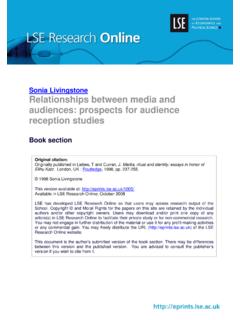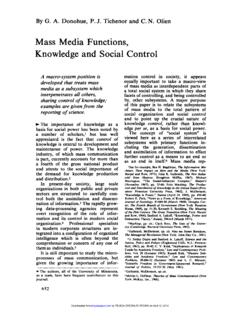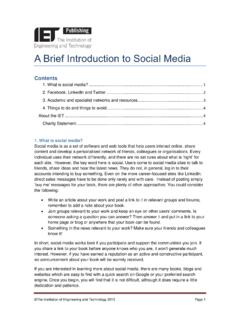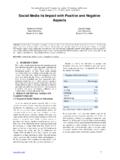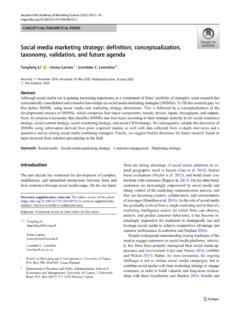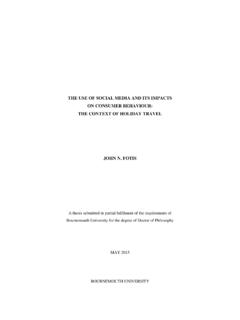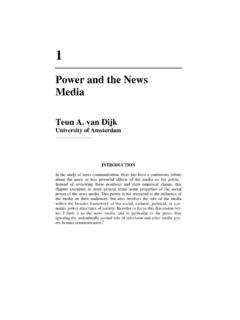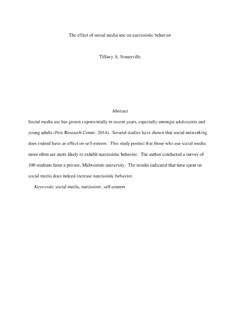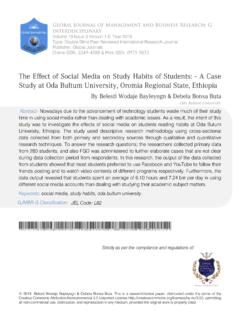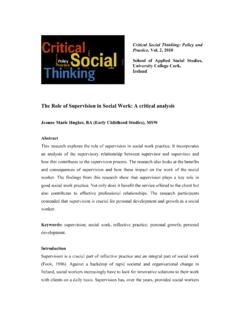Transcription of Social media and activism - LSE Research Online
1 Bart Cammaerts Social media and activism Book section Original citation: Originally published in Mansell, R., Hwa, P., The International Encyclopedia of Digital Communication and Society. Oxford, UK : Wiley-Blackwell, 2015, pp. 1027-1034. 2015 The Author This version available at: Available in LSE Research Online : June 2015 LSE has developed LSE Research Online so that users may access Research output of the School. Copyright and Moral Rights for the papers on this site are retained by the individual authors and/or other copyright owners. Users may download and/or print one copy of any article(s) in LSE Research Online to facilitate their private study or for non-commercial Research . You may not engage in further distribution of the material or use it for any profit-making activities or any commercial gain.
2 You may freely distribute the URL ( ) of the LSE Research Online website. This document is the author s submitted version of the book section. There may be differences between this version and the published version. You are advised to consult the publisher s version if you wish to cite from it. -1- Social media and activism Bart Cammaerts London School of Economics and Political Science Word Count: 4,259 (excluding abstract, keywords and bio) Abstract: This entry provides an overview of the ways in which Social media and digital networks are contextualized and examined in relation to Social movements and activism . A number of communicative practices that activists deploy are identified and the ways in which information and communication technology (ICT)-mediated practices are embedded in roles and functions relevant to activists and Social movements are addressed giving attention to the importance of Social ties and networks Online and offline and to constraints and limitations of ICT use.
3 Networks and communicative practices increasingly manifest themselves as a field of contention which is giving rise to a digital rights and freedoms agenda that is being embraced by activists, non-governmental organizations and Social movements. Keywords: activism , censorship, citizenship, communication networks, computer-mediated communication, empowerment, information and communication technology, political communication, Social change, Social media , Social networks, strategic communication Author Biography: Bart Cammaerts is Associate Professor and Director of the PhD programme in the Department of media and Communications at the London School of Economics and Political Science.
4 He is the former chair of the Communication and Democracy Section of ECREA and vice-chair of the Communication Policy and Technology section of IAMCR. His most recent books include: Mediation and Protest Movements (eds with Alice Matoni and Patrick McCurdy, intellect, 2013), media Agoras: Democracy, Diversity and Communication (eds with I aki Garcia-Blanco and Sofie Van Bauwel, Cambridge Scholars Publisher, 2009), Internet-Mediated Participation beyond the Nation State (Manchester University Press, 2008) and Understanding Alternative media (with Olga Bailey and Nico Carpentier, Open University Press, 2008). -2- Social media and activism Until recently Research in the political science field and in Social movement studies had little to say about the precise role of communication and communicative practices in the construction of collective identities and protest movements, their sustainability or the development and spread of contentious politics.
5 This is surprising as communication and mediation can be positioned as a pivotal component in a wide variety of mobilizations and struggles throughout history. A Social movement is a Social process through which collective actors articulate their interests, voice grievances and critiques, and proposed solutions to identified problems by engaging in a variety of collective actions. These movements have three features: 1) they are conflictual and have clearly identified (ideological) opponents; 2) they are structured through dense informal networks; and 3) they are geared towards developing, sustaining and sharing collective identities (della Porta and Diani, 2006) The emergence of digital networked technologies has led to the convergence of channels of distribution and communication formats including Social media .
6 The profound impact of networked technologies on societies economically, socially and politically has led some to claim that we have entered a new era of the Information, Network or knowledge Society. The emergence of the Internet has resulted in a polarized scholarly debate about the impact and normative consequences of ICTs and Social media , in particular. In this entry ICTs are referred so as to include mobile communication and the Internet which support Social media platforms. However, even sceptics of the potential of ICTs to fundamentally alter power relations in society acknowledge the opportunities for disadvantaged groups to self-represent themselves, communicate independently and organise transnationally.
7 Social media are playing an increasingly constitutive role in organizing Social movements and in mobilizing on a global level. A large segment of the literature in this area focuses on whether, how and to that extent, networked technologies and Social media platforms are related to the mobilization for, and the organisation of, contentious politics with an emphasis on five themes: 1) Types of usage and forms of communicative practices 2) Roles and functions of Social media 3) Networks, ties and the relational 4) Opportunities and structural constraints 5) Online spaces as a field of contention Some studies focus on identifying the types of use of Social media by Social movements and activists and the variety of media and communicative practices that are being developed.
8 These practices serve certain functions and fulfil certain roles in support of organising, coordinating and engendering Social change. These developments have an impact on Social networks and Social ties which are important to understand to make sense of the relational aspects of mobilisation and organisation. Researchers often examine the -3- specific affordances and constraints associated with the use of Social media the conflicts over, for example, Online privacy. Forms of Communicative Practices Research on communicative practices is concerned with what activists do with Social media . A focus on communicative practices provides insight into how media and communication tools are embedded in activists situated lives and how their actions fulfil both material and symbolic goals.
9 Communicative practices provide opportunities for agency and users of Social media have to contend with systemic structural constraints that impede or close down certain options. Practice theory is drawn upon to better understand how media and communication tools are embedded in the everyday lives of activists and how mediated practices are intertwined with non-mediated mechanisms and processes in societies. Research on the use of networked technologies by activists and protest movements situates itself at the intersection between Social context, political purpose and technological possibility (Gillan, et al., 2008: 151). What is possible, however, changes over time as a result of technological innovation by engineers and from the way users appropriate technologies and embed them in their everyday practices, retooling them to suit their needs and purposes.
10 For instance, Twitter was not invented to coordinate protest events, but a Social constructivist approach is helpful in understanding that technology innovation and practice is co-shaped by designers and users. Different kinds of web protocols and Online platforms enable various types of communicative practices. The main initial Internet Protocols (IPs) available to users included the Post Office Protocol (POP) and the Simple Mail Transfer Protocol (SMTP) making email possible; Telnet enabling one-to-one or few-to-few Internet Relay Chat (IRC); File Transfer Protocol (FTP) to upload and download digital files; and Usenet newsgroups, the precursor to Online forums. These were followed by Hypertext Transfer Protocol (HTTP) enabling website development and the World Wide Web.
